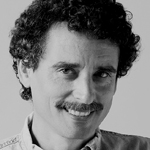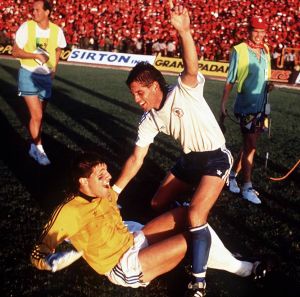 Not long after the World Cup ended, I was given New York Daily News columnist Filip Bondy’s book, “Chasing the Game: America and the Quest for the World Cup.” As a serious soccer enthusiast, I gobbled it up and would highly recommend it to anyone interested in the sport. Bondy, a veteran journalist who graduated from the Annenberg School of Communications in 1975, follows the United States Men’s National Team throughout the qualifying stages of the 2010 World Cup, while splicing in key historical moments and profiling players, coaches and others involved in the U.S. Soccer Federation. Keep reading to find out Bondy’s motivation for writing it, his insights into American soccer culture, and a Penn record he claims no one has ever matched:
Not long after the World Cup ended, I was given New York Daily News columnist Filip Bondy’s book, “Chasing the Game: America and the Quest for the World Cup.” As a serious soccer enthusiast, I gobbled it up and would highly recommend it to anyone interested in the sport. Bondy, a veteran journalist who graduated from the Annenberg School of Communications in 1975, follows the United States Men’s National Team throughout the qualifying stages of the 2010 World Cup, while splicing in key historical moments and profiling players, coaches and others involved in the U.S. Soccer Federation. Keep reading to find out Bondy’s motivation for writing it, his insights into American soccer culture, and a Penn record he claims no one has ever matched:
PENN GAZETTE SPORTS: What kind of reception and feedback has your book received since it was released?
FILIP BONDY: It got very nice reviews and the blogs were about 90 percent positive. It got a lot of good publicity, but I’ll be honest with you: it didn’t sell as much as I thought it would during the World Cup – which was kind of disappointing. It wasn’t a personal disappointment but more of a disappointment because it indicates the interest in soccer may not be as steep as we thought. It’s kind of a fickle fan base and it’s still evolving in this country. With this book, I learned the hard way I guess that the American soccer fans are an eclectic group.
PENN GAZETTE SPORTS: But as someone who has covered soccer for more than two decades, how much have you seen the sport grow in this country?
FILIP BONDY: Oh, don’t get me wrong: It’s night and day from when I first started. You know, you would see the United States play Brazil in the Yale Bowl and get 18,000 people way back in 1993. The sheer exposure on television, that’s the biggest difference. It wasn’t that long ago when I was in my 20s or 30s when the only soccer I could watch was on the Italian network on Saturday and Sunday mornings. Now, to be able to watch English Premier League, to watch every United States match, to watch every World Cup match in high definition – that alone, I think, has changed the dynamic of support in the United States.
PENN GAZETTE SPORTS: What kind of research went into writing this book – and how much of it was based on your old articles and your own recollection?
FILIP BONDY: I started covering the national team in about 1989, so must of the stuff after 1989 was recollections and then interviewing those players to flesh it out. Anything that happened before 1989, I clearly had to do my homework. I did a lot of research and talked to a lot of people.
PENN GAZETTE SPORTS: Was 1989 [when the U.S. qualified for the World Cup for the first time in 40 years] a defining moment for you as both a fan and a journalist?
FILIP BONDY: It was a defining moment as a journalist because I really finally got a chance to cover the sport I loved already. But it wasn’t a defining moment as a fan. I’m a first generation kid — my father was Czech and he brought me to international soccer games. I grew up playing soccer right through college, and even beyond. I loved the sport and always wanted to cover it. And I finally got an editor who sent me to Costa Rica for a U.S. vs. Costa Rica qualifier. Boy, that was just fun. It really opened my eyes to the World Cup cycle. I was already pretty aware of international soccer but the World Cup cycle was something I became fascinated with.

The 1989 U.S. national team greeted Bondy by qualifying for the World Cup for the first time in 40 years
PENN GAZETTE SPORTS: Has there always been a push-and-tug with your newspaper editors about covering soccer?
FILIP BONDY: I’ve had about 10 sports editors in my day and I’d be lying if I said any were interested in soccer. It’s ranged from indifference to out-and-out animosity. These are good sports editors but every one of them was not into soccer. I keep waiting but I’ve never had that one that said, ‘You’ve got to go out there, we’re going to become the destination read for soccer fans.’ Last week, I asked one of my editors if I could go cover the Galaxy against the Red Bulls, which are the two franchise teams in MLS right now. And he said, ‘We’d rather have you at the Mets.’ So there you go.
PENN GAZETTE SPORTS: Has it ever been hard balancing being an author with your newspaper job?
FILIP BONDY: No, that’s been wonderful. As far as my time is concerned, I find books much better than doing TV or radio because books you can pretty much do when you want. If you can get a book contract, I think it’s a perfect complement actually to a newspaper career.
PENN GAZETTE SPORTS: I particularly enjoyed learning more about the history of the sport in this country. Looking back on it, what was your favorite part of the book and what did you learn yourself?
FILIP BONDY: What did I learn? Well, I learned about [head coach] Bob Bradley actually. I didn’t know much about him before writing the book. And with the 1950 team for example, I had assumed from watching the movie on that game [“The Game of Their Lives”] that the English players were obnoxious, arrogant guys. Walter Bahr set me straight on that and said they were gentleman, they congratulated after the game and guys said to him, ‘We could have played forever and we wouldn’t have scored against you.’ So that was eye-opening for me.
PENN GAZETTE SPORTS: For a lot of soccer fans, World Cup qualifying can be overlooked. Have you gotten the sense that it seems Americans almost expect now to see their team make the World Cup every four years?
FILIP BONDY: I think it can be overlooked for a number of reasons. First of all, there’s not much suspense in CONCACAF [Confederation of North, Central American and Caribbean Association Football]. You can pretty much pencil in the United States and Mexico. That’s one problem. Another problem is sometimes the most important road matches you can’t even watch. That’s what happened this year. The most important match of all was in Honduras toward the end, and it was a wonderful match and you couldn’t get it unless you went to a sports bar. That was a contractual problem that U.S. Soccer had with the Honduran federation. So you come across these weird problems and then add the fact that there’s not much publicity in local papers in terms of advancing the matches … it all combines to make qualifying a different experience in United States then it is in Europe, when fans are watching every game breathlessly.

The Americans celebrate qualifying for the World Cup after an arduous -- but sometimes overlooked -- journey
PENN GAZETTE SPORTS: Is that one of the main reasons you wrote the book – to expose the World Cup qualifying because it can sometimes be overlooked?
FILIP BONDY: Well, I love the World Cup cycle, not just the World Cup. In CONCACAF, the experiences are so unique. From the mud pile that Barbados calls a home field to the absolute pit in Costa Rica – you get these experiences that you wouldn’t get anywhere else in the world. You get to travel to crazy places. And it’s tremendous fun.
PENN GAZETTE SPORTS: Another particularly interesting part of book I thought focused on the national team’s mistakes in keeping some of their top prospects. From your experience, what do you think U.S. Soccer can do, if anything, to become one of the elite teams in the world?
FILIP BONDY: Sometimes they look closer than other times. I really don’t know. It’s a very confusing thing. They seem to play very well against finesse European teams like Spain, Italy, France and Portugal. But then they come up against very different teams from Northern Europe or Eastern Europe or, god forbid, Argentina and Brazil, and they look light years away. Everyone is still waiting for that great scorer who can make a difference. I do think we will eventually see that player, and when we do we may be a lot closer than we are right now. But I don’t think I see that player yet.
PENN GAZETTE SPORTS: What was your time at Penn like?
FILIP BONDY: I earned the fastest degree in Annenberg in history. I made it through in less than two years – in a year-and-a-half, which I don’t think anyone has ever done. I want that on the record: nobody has equaled that, I’m sure. Annenberg is famous for keeping people forever. … I’m happy I got a graduate degree. I probably wouldn’t have been hired at the New York Times when I was, and it helped me get teaching jobs. And I really enjoy Philadelphia, which I think is the most underrated city in America.
PENN GAZETTE SPORTS: Finally, do you have any early predictions for 2014?
FILIP BONDY: Well, it will be in Brazil. There are pretty much seven or eight teams that you know are going to advance beyond the first round, and then there are probably four or five teams that you know have no chance of advancing. We are in between those two groups, and we’ll probably still be between those two groups for the next World Cup, unless we find that golden generation, which we’re waiting to come along. We had a version of that with John Harkes and Tab Ramos and Tony Meola, who were all from one town basically. We’re waiting for a second wave to lift us the other step. We’ve had a few players along the way like Landon Donovan and Clint Dempsey and Tim Howard, who could have been part of a golden generation – but they didn’t really have enough support elsewhere. We just don’t have that much talent – not yet. We need about three real stars and about six guys out there who are very good and we haven’t been able to find that. I think maybe some day we will but we don’t have it yet.


